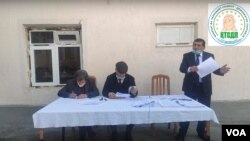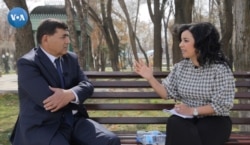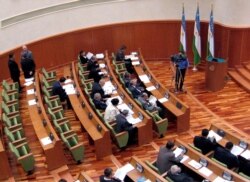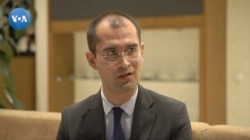Khidirnazar Allakulov, 65, is a man with a mission: He aims to change the Uzbek political landscape with his new movement called the "Truth and Development" Social Democratic Party.
But before Allakulov and his party can begin to reform a system he says is "evil" and "does not value its citizens and does not serve them in any way," he's going to have to get his party recognized.
"Truth and Development" proclaimed itself a party on March 8, 2021, and applied to be registered on April 7 with about 20,000 signatures from its supporters. The Justice Ministry has a month to consider and respond.
Campaigning for Uzbekistan's October 24, 2021, presidential election starts in July. Allakulov could be his party's candidate — if it actually gets on the ballot. "I'm not against the current constitutional system or aim to overthrow it," he said. "But I'm against the current leadership and oppose the way Uzbekistan is run now."
Since its independence in 1991, like other countries in Central Asia, Uzbekistan has struggled to overcome its legacy of Soviet rule. Islam Karimov ruled with an iron fist for 27 years from 1989 to 2016. His successor, President Shavkat Mirziyoyev, launched reforms aimed at rebalancing elements of Uzbek politics, devolving some powers from the executive to parliament, the Oliy Majlis.
Currently, Uzbekistan has five political parties. They are vocal about their platforms and introduce initiatives in parliament. Senate chairperson Tanzila Narbayeva even argues that the Oliy Majlis is now independent. "We don't take orders even from the president's office," Narbayeva told VOA. But none of these lawmakers dares to oppose the president, and all five are integral to the ruling elite.
Talking to VOA in Tashkent, Allakulov says he is the only man in Uzbekistan who has a track record of standing against what he calls a corrupt Uzbek government. He victoriously fought the dictatorship through 14 court cases — and took his grievances to the United Nations, which sided with him and reminded the Uzbek government of its legal obligations.
Following graduation from what is now Tashkent State University of Economics, he worked his way up to head Termez State University. Allakulov says he always stood against corruption, mostly losing to the system, because stealing and bribery are ways of life in Uzbekistan.
But Allakulov was fired as university rector and faced suits accusing him of corruption. By 2016, he had been indicted and seemed to have been just another part of the system he claims to want to change.
Allakulov rose through established institutions and, in that sense, also represents Uzbekistan's old guard. To his critics, he belongs to the same generation of arrogant, egoistic, self-righteous men who already run Uzbekistan.
"How different are you really?" VOA asked.
Allakulov agreed he does not represent new blood. "But I'm honest and said 'no' when the government pushed me to be corrupt, lie, steal, and violate rights.
"I suffered for years to clear my name, protect my wife and children from the hate my court cases created. It cost me my career. As an economics professor and holder of the highest academic degrees, I could have written books, shared knowledge and educated generations of Uzbeks. But instead," he said, "I fought for my honor and family."
But even as he has opposed the system, Allakulov has done well from it economically through his family construction business in southern Uzbekistan.
Allakulov attributes his success not to the Uzbek system but to his training in Washington. Because of what he learned in a 1990s exchange program, he says, he was able to put his money in the right places. He maintains it was that business savvy that allowed him to keep his wealth even as he battled Tashkent, local authorities, and the courts.
"I'm no angel! Not everything I have done has been correct or honorable. But I'm here openly discussing my commitment to change the country."
If he can create a true opposition party, it would be a significant change for a country that has never held free or fair elections, according to international observers such as the Organization for Security and Cooperation in Europe.
One consistent criticism has been that Uzbek elections always lack competition and real choices for voters. And its neighbors fare little better. Kyrgyzstan is the only Central Asian country that earns relatively higher marks for its elections; Kazakhstan, Tajikistan, and Turkmenistan – like Uzbekistan – have always lacked basic freedoms and fall short of the requirements for democratic elections.
Allakulov says his party can fill that void, but complains about harassment and barriers to political entry. Allakulov says he has not gone to the General Prosecutor's Office because he does not trust it, or any part of the government.
But the authorities deny those claims. Avazbek Madaminov, head of the Justice Ministry's NGO Department, tells VOA that his office maintains a neutral position, and is a responsible body for applicants to register as a nongovernmental organization or political party.
"If these allegations have any basis, this group should file a formal complaint. If we receive them, we will pass them to the relevant entities to investigate."
Allakulov accuses the ministry of sharing confidential information with the security services, who, he says, have bullied him and his followers for months. "The government has done everything it can to block our way and try to distract us from our mission."
Madaminov dismisses these assertions.
"Truth and Development," Allakulov says, wants separation of powers and rule of law. But all five existing parties more or less say the same thing. And Mirziyoyev himself claims that he is committed to ensuring Uzbekistan will be "a true democratic and just society."
The more VOA pushed Allakulov for clarity on his program and ideas, the more his responses suggested that these things are a work in progress. He was often vague, mostly rhetorical, and offered few coherent ideas that were not much different from those espoused by existing parties.
Allakulov says he will tackle corruption, human rights and rule of law, Central Asian unity, and economic development. Mirziyoyev's agenda looks similar but Allakulov argues his party's strategy and tactics would differ dramatically.
Once registered, he said, "we will disclose our concrete plans."
Senate Chairperson Narbayeva tells VOA that public pressure for fairness should guide the system to hold proper presidential elections. She said new parties should "follow the procedures. That's the way to get registered."
If that happens, Allakulov's party may have an opportunity to make good on its promises of reform.














